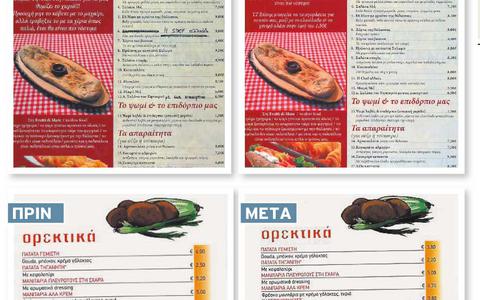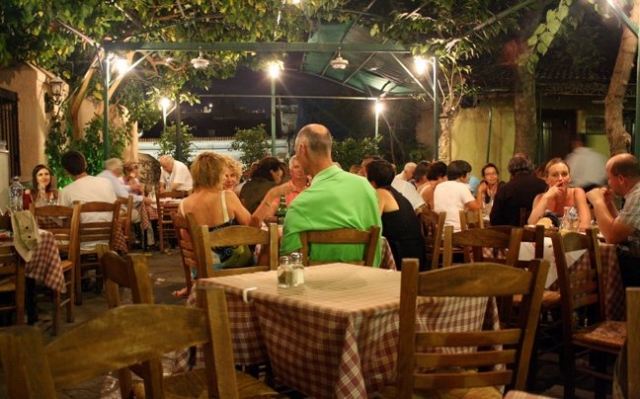Before the entry into force of the pilot measure for the reduction of VAT, authorities may have relied on the fact that at least half of the owners in the restaurant industry will respond to the call for a reduction of prices, but so far, according to a survey of Ethnos newspaper, as well as according to updated data of the Federation of professional traders and industrialists in Greece, only about 20% of eateries have changed their price lists.
So far, according to data of the Federation, of the nearly 70,000 restaurant owners, only 15,000 (or 21.4%) have received the special sign certifying the price reduction.
Basically, this is the main conclusion of the study carried out by Ethnos newspaper in various areas of Athens and Thessaloniki - a conclusion that confirms news coverage from the first days. For example, in a large chain of fast food restaurants, the new prices on the menu were reduced by an average of 8%. The old prices, however, were slightly higher, which further complicated the comparison between the old and new prices.

In an interview for Ethnos newspaper, President of the Federation of professional traders and industrialists in Greece George Kavatas predicted that the number of companies that have received the special sign certifying the price reduction will exceed 30,000 by the end of August.
If this prediction proves true, the percentage of companies involved in the agreement for the reduction of VAT will reach 42.8%, i.e. almost every second company will have put a sign certifying the decrease in its price list.
"Despite the long delay, the VAT reduction is a positive step in the right direction, which somewhat corrects the mistake with the raising of the tax to 23% two years ago," said George Kavatas. "We think it will provide the necessary breathing space for companies in the industry which will improve somewhat their liquidity, provided that they will have to pay less VAT. We should note that there has been no profit in the restaurant industry for two years. The total reduction in turnover during the last three years is approximately 80%. As for the total annual turnover, from 11.5 billion euro in 2008, it has reached the foreseen 6.5 billion euro for 2013."

"The decline is dramatic and the sharp decline in people's incomes is one of the reasons," explained George Kavatas and added: "We are optimistic that the correct application of the measure, combined with a reduction in the tax rate will have a positive impact on other industries, too, such as trade and service provision. We, as a Federation, are making every possible effort."
The comments of businessmen themselves, however, are not unanimous.
Nikos Iliopoulos, owner of a restaurant in Kolonaki with higher category prices, explained why he is not eager to take the special sign: "We have reduced the prices really, and not virtually, by 25%. We have had regular customers for 18 years who see this fact themselves. We could not lie to them even if we wanted to. In other words, in practice we have applied the logic of the sign for a long time now; we have even exceeded it, because it provides for a reduction in prices of 5%."
Michalis Kolios, who owns a restaurant in the suburb of Pendeli, has a different opinion on the matter: "We introduced the measure from the first moment, although the new laminated menus cost us 500 euro. We reduced prices by an average of 12%."
In Thessaloniki ... they "ate up" the reduction
Very few restaurant owners have reduced their prices after the VAT reduction. Eight out of ten restaurants and fast food restaurants in Thessaloniki "ate up" the reduction of VAT by maintaining their prices, arguing that they did not increase them when VAT was increased two years ago. Some have reduced their prices. However, they have reduced portions, too.
"The owner of the restaurant across the street reduced the price of sardines from 5.90 euro to 5.50 euro, but now he serves 8 sardines in a portion, while before that he served 12," a restaurant owner in the centre who has not reduced his prices said for Ethnos, revealing his competitor who has reduced them. A lot of people are thinking of other ways to increase their turnover, showing at the same time their social commitment through seemingly lower prices.
For example, a restaurant in the famous Ladadika neighbourhood takes 1 euro service charge per person, i.e. for a family of four – 4 euro. Much speculation is observed in terms of bottled mineral water, the price of which often starts at 1.70 euro/l and may reach a lot more.
Sources in the industry revealed for Ethnos that service charges, French fries and bottled water provide great opportunities for increasing profits in the restaurant business.

"We buy fresh potatoes at a price of 0.70 euro/kg and sell a portion of French fries for 3 euro. Think about how many portions you can get from 1 kg potatoes and you will see what we gain," said one of them.
"Colleagues are reacting slowly," said Chairman of the Association of Restaurateurs in Thessaloniki Panagiotis Gofas, but added that "the measure will work in favour of customers, but it will take a little time."
According to Panagiotis Gofas, 20% of eateries in Thessaloniki have reduced prices and have received the special sign that certifies this and he recommended to his colleagues that they cut prices because there are opportunities for profits.
"They can reduce prices by at least 5%. For example, for sandwiches, the price could fall by 0.10 euro to 0.15 euro. On the one hand, it is important for the customer, and on the other hand, businesses can bear it," he said, stressing that time will work in favour of the measure, but so far there is no information among owners of eateries.

President of the Society of Restaurateurs in Thessaloniki Panagiotis Gofas
Transfer of responsibility to suppliers
Representatives of the restaurant industry in Thessaloniki have transferred the responsibility for failing to cut prices to suppliers. "How can we reduce prices when suppliers do not do so? We cannot afford more price reductions, because this will make a mess of our accounts. Traders buy beef from the slaughterhouse for 4 euro/kg, and I buy it for 7-8 euro/kg. If I bought it for 5.5 euro/kg or 6 euro/kg, I could sell cheaper steaks and other dishes of veal," Panos Dimitriou, who owns a restaurant in Ladadika told Ethnos. He also noted that prices are already very low, and owners of eateries have not increased them, despite the VAT increase two years ago.